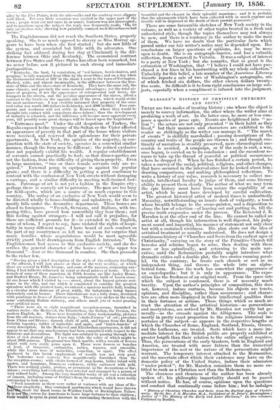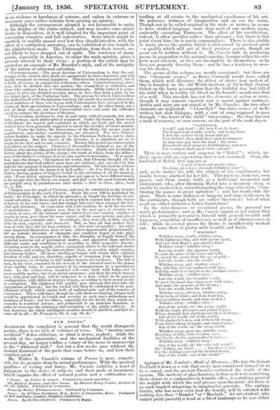MARSDEN'S MISTORY OF CR1tISTIAN CRIIRCHES AND SECTS. * Timm are two
modes of treating history ; one where the object is merely to convey information' the other where the writer aims at producing a work of nit. In the latter case, he more or less com- poses a species of prose epic. Events are heightened into " ac- tion " : the actors are not only presented " in their habit as they lived," but their manners and characters are exhibited to the reader as strikingly as the writer can manage it. " The march of events " is skilfully marshalled ; passing descriptions of the country and traits of the people are thrown in ; and though con- tinuity of narration is steadily preserved, inure chronological suc- cession is avoided. A campaign, or if the scale is curt, a war, once begun, is carried on to its conclusion ; and the raconteur re- turns to take up the thread of peaceful or political occurrences where he dropped it. When he has finished a certain period, he takes a survey of the social, political, religious, and other changes, that have occurred in the'interval since last he looked about him ; drawing comparisons, and making philosophical reflections. To write a history of any value, research is necessary to collect ma- terials, intellectual faculty to judge of them, and some literary ability to present them clearly. The author of what we may term the epic history must have from nature the capability of tin artist, which he must have developed by careful cultivation.
The greatest historical artist of modern times is undoubtedly Macaulay, notwithstanding an innate dash of vulgarity, a touch whose breadth belongs to the scene-painter, and a disposition to abuse the law of selection—of leaving out and putting in, till the precise truth evaporates under the process., Reverend J. B. Marsden is at the other end of the line. e cannot be called an
artist at all, though his information is well digested, his judg- ment sound and impartial, his manner of statement not only clear but with a sustained vividness. His plan shuts out the idea of artistical treatment as usually understood. lie does not design a continuous history of " Churches and Sects from the earliest ages of Christianity," carrying on the story of the Primitive Church till heresies and schisms began to arise, then dealing with them more or less episodically, and returning to the main nar- rative until the Reformation probably might introduce what dramatic critics call a double plot, the two stories running paral- lel. On the contrary, he treats each church or sect as an independent thing, and throws the whole into an alpha- betical form. Hence the work has somewhat the appearance of an encyclopmdia : but it is only in appearance. The expo- sition has the freshness of an original work. From the space into which the subject is condensed, there is of necessity much brevity. Upon the author's principles of composition, this does not, hoWever, induce curtness, because his objects are tenets, opinions, and discipline, rather than occurrences ; and charac- ters are often more displayed in their intellectual qualities than in their fortunes or actions. Those things which so much at- tract the attention of the artistical historian—as persecutions and martyrdoms, are noticed by Mr. Marsden not curtly but ge- nerally—as the crusade against the Albigenses. The scale is mostly in pretty exact proportion to the religious historical im- portance of the subject—as appears in the respective lengths at -Which the Churches of Rome, England, Scotland) Russia, Greece, and the Lutherans, are treated. Sects which have a more im- mediate interest for the British public are properly exhibited at ater length than their relation to the entire subject requires. Thus, the persecutions of the early Quakers, both'in England and America, are treated. with more fulness than the numerical importance of the sect or the nature of the persecutions might warrant. The temporary interest attached to the Mormonites, and the uncertain effect which their existence may have on the domestic policy of the United States, induce their admission " under protest ' ; for Mr. Marsden considers them no more en- titled to rank as a Christian sect than the Mahometans.
The closeness and clearness of the author has been already spoken of ; his philosophic impartiality should not be passed -Without notice. He has, of course, opinions upon the questions and conduct that continually come before him ; but he indulges
* Dietory of C'hristian Churches and Sects, from the Earliest Ages of Christi- anity. By the Her. .1. E. Marsden, M.A., Incumbent of St. Peter's, Bermingham,; Author of " The History of the Early and Later Puritans," In two volumes. Published by l3entley.
in no violence or harshness of censure, and unless in extreme or necessary cases rather refrains from passing an opinion.
Although the arrangement adopted is not favourable to unity in the display of the entire subject, and may involve some minor faults in disposition, it is well adapted for the important point of conveying complete and full information. Sects which might be omitted, or rapidly passed over lest they should interfere with the effect of a continuous narrative, can be exhibited at due length in the alphabetical mode. The Universalists, from their tenets, are not likely to have dropped out of sight. The tendency of many minds, especially in America, to adopt the main opinion, gives a present interest to their views : a portion pf the article may be quoted as an example of Mr. Marsden's style, and of the antiquity of the notion of universal salvation.
"Usrvenslaisrs.—The great doctrine of Universalism is, that the suf- ferings of the wicked after death are purgatorial in their character, and will finally terminate in eternal happiness. Ws doctrine is fundamental ; but it is held, of course, in conjunction with many others. Universalists may, how- ever, now be divided into two parties; the evangelical or orthodox, and those who embrace Arian or Unitarian sentiments. Of the latter it is unne- cessary to give any detailed account, since, in fact, they form a part, by far the larger part, of the Unitarian body. The process by which Universalism has linked itself with Sociniunism has been the result of a mutual attraction. Great numbers of those who began with Unitarianism have advanced in the course of their speculations to Universalism; and, on the other hand, not a few of those who set out from Universalism have cast aside the orthodox creed to embrace the doctrines of Socinus.
"Universalism professes to rest in part upon critical exegesis, but more fully, perhaps, upon philosophical argument. Under the former, those texts of Scripture are argued and explained in which our Lord and the sacred writers have been generally supposed to assert the eternity of future punish- ment. Under the latter, the benevolence of the Deity, the proper ends of punishment, and similar considerations, are advanced. Nor does Univer- salism hesitate to make its appeals to the Christian Fathers, and to claim their sanction. Dot few traces of the dOctrine, it is admitted, are to be found in the first and second centuries. During this period no controversies had arisen on the subject. Clemens of Alexandria is claimed as one of the Fathers who during this period held these doctrines. Bailie and Archbishop Potter admit the justice of the charge ; the truth of which, from the diffuse- ness of the father's writings, it is no easy matter to determine. It is mani- fest,' says the former, throughout his works, that Clemens thought all the punishments that God inflicts upon men are salutary, and executed by him only for the purpose of instruction and reformation. Of this kind he reckons the temente which the damned in hell suffer.'—.De Thu Patents?, lib. ii. 4. Potter, having spoken of Origen's belief in the salvation of all the damned, adds, From which opinion Clemens does not appear to have differed much, as he taught that the Devil can repent, and that even the most heinous sins are purged away by punishments after death.'—Note in Clem. Alex., book vi., p. 794. " Origen was the pupil of Clemens, and may be considered as the founder of Universalism in the early Church. About the year 230 he published his books De Principiis,' in which he advocates at length the doctrine of uni- versal salvation. It forms part of a system which exposed him to the charge of heresy in his own times, and has ranked him ever since amongst the fan- ciful and visionary. In connexion with Universalism he held the doctrine of preexistence. His opinion was, that in the past ages of eternity God created, at once, all the rational minds which have ever existed, whether of angels or men, gave them the seine nature and the same powers, and placed them all in one celestial state. Accordingly, they were all, at first, exactly alike in rank, capacity, and character. But; as they all had perfect free- dom of will, they did not long continue in this state of equality ; for while some improved themselves more or less, others degenerated proportionally, till an Infinite diversity of character and condition began to take place among them, In eousequence of this, the Almighty at length formed the material universe out of preexistent matter, and appointed those spirits to different ranks and conditions in it according to their respective deserts; elevating some to the angelic order, consigning others to the infernal abodes as daimons, and sending the intermediate class, as occasion might require, into human bodies. All these intelligent beings still retain their original freedom of will, and are, therefore, capable of returning from their former transgressions, or of rising to still higher degrees of excellence. The fall of man, in his view, consisted in the descent of the celestial soul to the prison of an earthly body, in consequence of its transgressions in a preexistent state. In the resurrection, mankind will come forth with bodies not of gross earthly matter, but of an aerial substance; and then the whole human race, both good and bad, will be subjected to a fiery ordeal in the general conflagration, with different degrees of pain, according to their moral purity or corruption. The righteous will quickly pass through this trial into the enjoyments of henYell but the wicked will then be condemned to the pun- ishments of hell, which consist both of inflicted pain and of the remorse of conscience. These sufferings, though he calls them everlasting, Origen held would be apportioned in length and severity to each one's wickedness and hardness of heart; but for others, especially for the Devil, they would ne- cessarily be rendered intense, and protracted to an immense duration, in order to overcome the obstinacy and corruption of the gaily sufferers. At last, however, the whole intelligent creation should be Ruffed, and God be- come all in all.—De Principils, lib, ii. cap. 10, &c."































 Previous page
Previous page